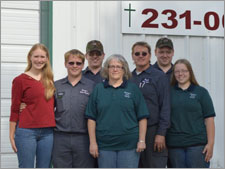
Call
620-231-0072 for service.
Getting the most out of your tank of gasoline!
Any time the engine is running and the tires aren't turning you are getting 0 mpg! Don't drive through any drive thru. Park your car shut your engine off and walk in. Don't drive your car two blocks to get a loaf of bread. Walk, your doctor will be pleased. Don't warm up your car just to get in a warm car.
Don't drive with quick starts or fast acceleration. With fuel injected engines, the farther you push on the accelerator the worse your fuel mileage will be. You should drive moderately and keep your foot steady on the accelerator. Drive the speed limit or a little less. Use the cruise control. This will keep you from driving too fast. You won't miss the radar detector, or the speeding fines.
Check the air in your tires weekly. Set the air pressure to the maximum pressure as written on the sidewall of the tire. This will make them roll with the least resistance, but this may make your car ride a little rougher.
If your vehicle has an overdrive transmission, drive it in overdrive range, except under conditions where your owners manual instructs otherwise. Like while pulling a trailer or driving in hills or mountains.
Do all the regular maintenance on your car. Especially replacing the filters. Air and fuel filters can drastically effect your fuel mileage. We recommend replacing fuel filters every 6 months. Clogged fuel filters are a major cause of failed fuel pumps. Some fuel pumps cost more than $700 to replace.
Always pay attention to the indicators on the instrument panel. A check engine, service engine soon, or emissions indicator on, most likely means that the emissions system is having a failure, or that maintenance is required. These could all effect your fuel mileage.
If your car has a engine temperature gage, make sure the temperature is getting up to the normal range for your car. The normal operating temperature for most cars is 195 degrees. If your car is only getting to 160 degrees this could reduce your mileage up to 5 mpg. If your car doesn't have a temperature gage, you can have your auto technician check this.
If your car has an engine tachometer, watch this gage. This is a good indicator how your automatic transmission is operating. At 55 mph lets say, for example, that the normal engine rpm for your vehicle is 1200 rpm. If you notice that instead of 1200 rpm it reads 1600 rpm. This could indicate that the transmission is slipping, or that the transmission is not shifting up to the highest range. This will drastically effect your fuel mileage.
When choosing the proper gasoline for your car, check your owners manual. If your car is designed to use 87 octane gasoline it will not help the performance or the mileage by putting 91 octane in your car. In cold weather you can actually hurt the performance by using 91 octane where 87 is recommended.
If your manual recommends 91 octane gasoline, using 87 octane gasoline will definitely hurt your mileage, and the performance of your car.
Get a locking gas cap.
Fuel injector cleaner, added to your fuel tank, will help keep your injectors clean. They usually won't clean up a restricted injector that is causing a misfire, but use them with caution. By putting these cleaners in the fuel tank, you are exposing the fuel pump, which is in the tank on most fuel injected vehicles, to caustic chemicals. This could shorten the life of the fuel pump and the fuel injectors if used too often. Some vehicles are more likely to need the injectors cleaned than others. I would recommend you check with your auto technician for specific advice on your vehicle.
Randy Woods of Randy's Auto Repair
Testimonials:
“I've had bad experiences with other mechanics.
It's a relief to find one I can TRUST!” J.S., Pittsburg
“You're all so friendly! And always there to help.
Thanks!” J.A., Frontenac
“You get more than 'Auto Repair', you get 'Service'.” D.W., Girard
The Crew:


